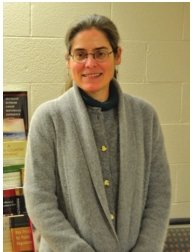
Catherine Cocks, the new editor-in-chief of Michigan State University Press, is a curious person. She’s a perfect fit for the university’s academic press, which publishes dozens of new titles each year.
Cocks, who is replacing longtime editor and soon-to-be-retired Julie Loehr, took time from acclimatizing herself with her new job, the university and East Lansing to talk with City Pulse in her office.
The new editor has extensive experience in academic or university presses; she’s spent time at the University of Washington, University of Iowa and a scholarly press in New Mexico.
During those stints she specialized in acquiring and editing titles covering Native American and Indigenous Studies. She’s also delved into American history, food studies and natural history.
Cocks has all the credentials for academia: An M.A. in history from University of California, Irvine and a Ph.D. from University of California, Davis. She received her undergraduate degree from Williams College.
Following a short stint teaching at the university level, Cocks decided teaching was not the career she wanted to pursue. Instead, she gravitated toward publishing at School for Advanced Research Press — a New Mexico publisher that specializes in anthropology titles.
“I was not cut out for teaching,” she said.
But it seemed she was a perfect fit for academic publishing.
“I really love it, and I am always being challenged. Basically, my curiosity is being satisfied,” Cocks said.
She said she also likes being around “smart people,” and working “behind the scenes and with a team.”
During her career she has shepherded hundreds of books to publication, one title in particular represents her broad interests and skills.
While at the University of Iowa Press, she worked with a university professor who grew up near Harlan, Iowa, where American stock car racing can trace its roots.
“He had a big story to tell about the first Daytona 500. The previous editor had rejected it,” she said.
Cocks, working with the author, helped turn the story into a written narrative, and the book was honored as one of the best motorsports books written in 2013.
The novel, “The Ghosts of NASCAR,” tells the story of the author John Havick, who, as a young boy, follows the birth of stock car racing and the controversial first Daytona 500.
“I especially want to thank editor Catherine Cocks. Catherine congenially worked line-byline and page-by-page, substantially improving the manuscript,” Havick wrote.
Since then, she has been on the lookout for another book on American car culture.
Cocks also has a distinct interest in tourism, especially early urban tourism. In 2001, she wrote the book “Doing the Town: The Rise of Urban Tourism in the United States, 1850-1915,” which grew out of her dissertation.
Cocks said she got the idea of looking into urban tourism while living in an upstairs apartment in San Francisco’s Chinatown, where she observed tourism first hand.
“In the early 20th century tourists were attracted by danger, strange food and exotic cultures,” she said.
Cocks has also written articles as varied as sun tanning, tourism across the Mexican border, carnivals and city festivals, as well as a second book on Southern tourism.
“Each particular press has its strengths,” Cocks said. She is complimentary of MSU’s strengths, the African and Native American titles in particular.
She said she’s had conversations with Gabriel Dotto, the MSU Press director, about acquisition of books on what she calls, “important contemporary issues, like aging and societal issues toward aging along with treatment of veterans, immigration and the aftermath of school shootings.”
Cocks is joining the press at a time when it routinely has annual offerings of books which win local, state and national literary awards. The books include subjects as wide-ranging as Indian racing, the success of salmon fishing in the U.S. and the history of three historic Michigan opera houses. The new editor said one of her goals is “To help other people discover.”
Support City Pulse - Donate Today!
Comments
No comments on this item Please log in to comment by clicking here